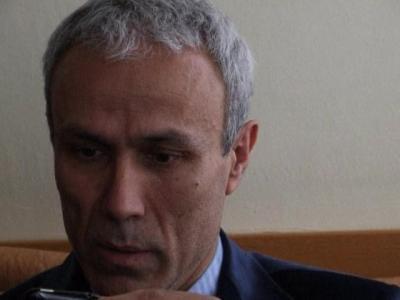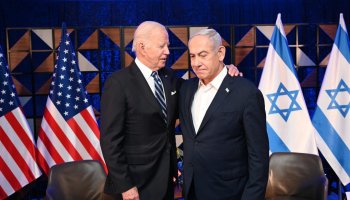ANKARA, Turkey – The Turk who shot Pope John Paul II in 1981 was released from prison on Monday after more than 29 years behind bars and proclaimed that he was a messenger of God and that the world will end in this century.
Mehmet Ali Agca, 52, waved to journalists as he left the prison in a convoy of several vehicles. Turkish authorities plan to monitor him closely because of long-standing questions about his mental health. Agca’s hair was gray and he wore a blue sweatshirt.
Agca shot John Paul on May 13, 1981, as the pope rode in an open car in St. Peter’s Square. The pontiff was hit in the abdomen, left hand and right arm, but the bullets missed vital organs. John Paul met with Agca in Italy’s Rebibbia prison in 1983 and forgave him for the shooting.
Following his release, he sat calmly between two plainclothes policemen in the backseat of a sedan that took him to a military hospital. There, doctors concluded that he was unfit for compulsory military service because of “severe anti-social personality disorder,” said his lawyer, Yilmaz Abosoglu.
In the statement distributed by Abosoglu outside the prison in Sincan on the outskirts of Ankara, the Turkish capital, Agca declared: “I proclaim the end of the world. All the world will be destroyed in this century. Every human being will die in this century.”
He ended the long, rambling text by signing off as “the Christ eternal,” in keeping with past outbursts and claims that he was the Messiah.
Upon his arrival at his hotel, he addressed reporters in English. He had traded his sweatshirt for a dark-blue suit and tie, apparently at the hospital.
“I will meet you in the next three days,” Agca said. “In the name of God, almighty, I proclaim the end of the world. All the world will be destroyed, every human being will die. I am not God, I am not son of God, I am Christ eternal.”
He also said the Gospel was full of mistakes and he would write the perfect one.
An army of journalists turned the lobby of the five-star hotel into a chaotic scene, scattering chairs as hotel staff looked on helplessly.
Agca later took the elevator to the room where he will spend his first night as a free man. His brother Adnan Agca said they would stay in Ankara for one or two days and are likely to travel to Istanbul later.
At the military hospital, Agca looked in good spirits and drank tea while waiting for final procedures to be completed, Abosoglu said.
Agca, who has said he wants to travel to the Vatican, does not have a passport.
Vatican spokesman Rev. Federico Lombardi said there were no plans to comment on the release. Robert Necek, spokesman for Cardinal Stanislaw Dziwisz of Krakow, Poland, who served as secretary to John Paul II, also would not comment.
The motive for the attack on the pontiff remains unclear but has not been linked to Islamic issues.
When Agca was arrested minutes after the attack, he declared he had acted alone. Later, he suggested Bulgaria and the Soviet Union’s KGB were behind the attack, but then backed off that line. His contradictory statements have frustrated prosecutors over the decades.
Prosecutors in Poland who are investigating Agca’s attack on Pope John Paul II said his release had no influence on the investigation.
“Testimony from a person who first sells the information to the media … is of no value to us,” prosecutor Ewa Koj of the National Remembrance Institute said. Koj also noted that Agca had changed his testimony many times.
Prosecutors of the institute are currently studying over 4,000 pages of documents, including Agca’s testimony, that they have received from Italy.
Agca had said that he will answer questions about the attack after he is released from prison. One of his lawyers said he would not speak on Monday but would rest in Ankara.
“We are not running away from the media, he may speak in a few days,” lawyer Gokay Gultekin said. Agca has said he is beginning to consider book, film and television documentary offers.
Agca was released after completing his sentence for killing journalist Abdi Ipekci in 1979. He had received a life sentence, which amounts to 36 years under Turkish law, for murdering Ipekci, but he escaped from a Turkish prison less than six months into the sentence and went on to shoot the pope in Rome two years later.
Agca reportedly sympathized with the Gray Wolves, a far right-wing militant group that fought street battles against leftists in the 1970s. He initially confessed to killing Ipekci, one of the country’s most prominent left-wing newspaper columnists, but later retracted his statements.
After his extradition on June 14, 2000, Agca was separately sentenced to seven years and four months for two robberies in Turkey in 1979. But authorities deducted his prison sentence in Italy and several amnesties and amendment of the penal code reduced his term further. The complex situation complicated the calculation of his remaining term and even led to his wrongful release from prison in 2006. He was re-imprisoned eight days later.
___
Associated Press Writers Selcan Hacaoglu and Gulden Alp contributed to this report.
Play Video Reuters – Pope gunman Agca freed















